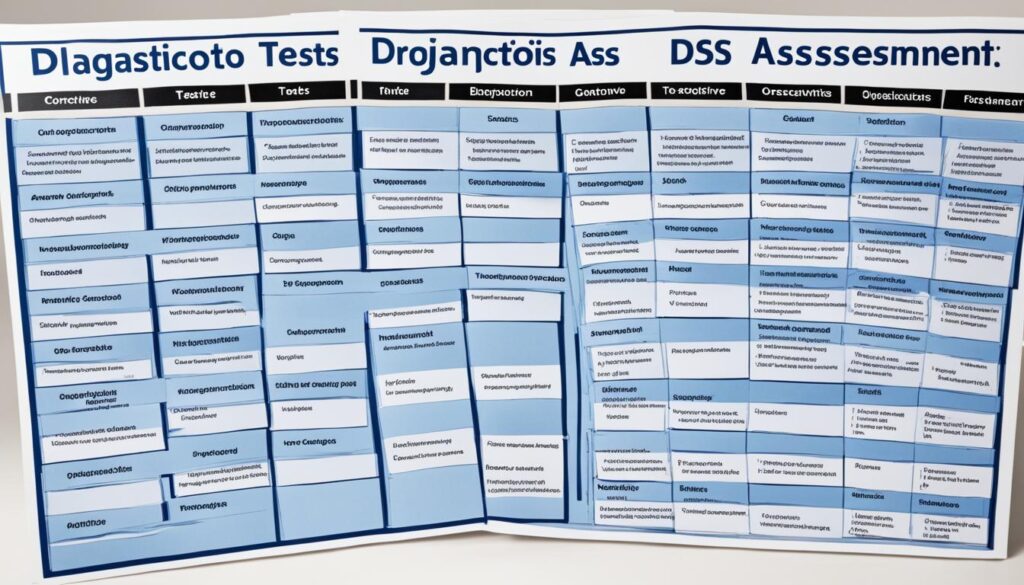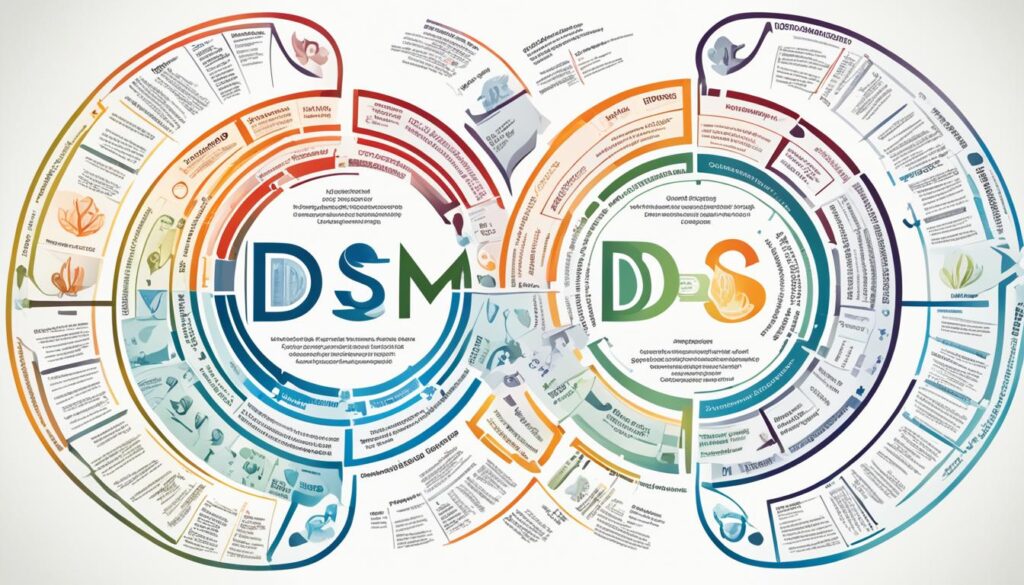Did you realize that precise evaluation and identification of mental health problems are essential for their successful treatment? Actually, studies reveal that approximately 1 in 5 adults in the United States face mental health issues in a given year. Given this substantial impact on the populace, it is crucial to comprehend the diagnostic standards and assessment tools to offer suitable assistance and support.
Key Takeaways:
- Diagnostic assessment tools are important in therapy as they help therapists make informed decisions about clients’ mental health.
- These tools include psychological tests, questionnaires, inventories, and clinical interviews.
- Assessment tools provide objective evaluation, diagnosis, treatment planning, and progress monitoring.
- Standardized assessment tools ensure reliable and valid results.
- Diagnostic criteria and assessment tools play a crucial role in evidence-based treatment and cultural sensitivity.
The Importance of Diagnostic Assessment Tools in Therapy
Diagnostic assessment tools play a critical role in therapy as they provide objective information about a client’s mental health, allowing therapists to gain a comprehensive understanding of their challenges. These tools are standardized instruments that therapists utilize to evaluate and measure various aspects of a client’s mental well-being, including symptoms, behaviors, emotions, and cognitive processes.
By using diagnostic assessment tools, therapists can make accurate diagnoses, develop personalized treatment plans, and monitor clients’ progress throughout the therapeutic process. These tools provide valuable insights that guide therapists in tailoring interventions to meet the specific needs of their clients.
Diagnostic assessment tools help therapists make accurate diagnoses, develop personalized treatment plans, and monitor clients’ progress throughout the therapeutic process.
The use of diagnostic assessment tools enhances the effectiveness of therapy by ensuring evidence-based practice, which refers to the integration of the best available research with clinical expertise and consideration of clients’ preferences. By employing these tools, therapists can make informed decisions based on objective data, leading to more targeted and effective interventions.
Furthermore, diagnostic assessment tools assist therapists in monitoring clients’ progress and evaluating treatment outcomes. By regularly assessing clients’ mental health, therapists can determine the effectiveness of interventions and make appropriate adjustments to the treatment plan as needed.
To illustrate the importance of diagnostic assessment tools in therapy, let’s consider an example. Sarah, a therapist, is working with a client named Alex who is experiencing symptoms of anxiety and depression. Through the use of standardized questionnaires and clinical interviews, Sarah gathers important information about Alex’s symptoms, triggers, and coping strategies. This comprehensive assessment enables Sarah to accurately diagnose Alex’s condition and develop a personalized treatment plan that incorporates evidence-based approaches.
Diagnostic Assessment Tools in Action: A Case Study
Table: Comparison of Diagnostic Assessment Tools for Anxiety and Depression
| Assessment Tool | Purpose | Key Features |
|---|---|---|
| Beck Anxiety Inventory (BAI) | Assess severity of anxiety symptoms | – Self-report questionnaire – Measures physiological and cognitive aspects of anxiety – Widely used in research and clinical practice |
| Hamilton Depression Rating Scale (HDRS) | Evaluate severity of depressive symptoms | – Clinician-administered interview – Measures various depressive symptoms – Widely used in clinical trials and research studies |
| Patient Health Questionnaire-9 (PHQ-9) | Screen for and monitor depression | – Self-report questionnaire – Measures frequency and severity of depressive symptoms – Quick and easy to administer |
By employing diagnostic assessment tools like the Beck Anxiety Inventory (BAI), Hamilton Depression Rating Scale (HDRS), and Patient Health Questionnaire-9 (PHQ-9), therapists can gather valuable data to inform their assessments, track progress, and guide treatment decisions. These tools enhance the therapeutic process by providing reliable and objective information.
Types of Diagnostic Assessment Tools
Diagnostic assessment tools play a crucial role in understanding the complexities of mental health. They come in various forms, including psychological tests, questionnaires and inventories, and clinical interviews. Each type of tool provides unique insights and serves specific purposes in the diagnostic process.
Psychological Tests
Psychological tests are standardized instruments used to measure specific psychological constructs or disorders. These tests provide objective and quantifiable data that aid in the diagnosis of conditions such as intelligence or depression. By evaluating an individual’s performance on these tests, therapists can gain valuable information about their cognitive functioning and identify areas that may require further assessment or intervention.
Questionnaires and Inventories
Questionnaires and inventories offer a broader assessment of an individual’s thoughts, feelings, and behaviors. These tools often consist of a series of carefully crafted questions designed to gather information about various aspects of a person’s mental well-being. By analyzing the client’s responses, therapists can gain a deeper understanding of their subjective experiences, identify patterns or symptoms, and tailor treatment plans accordingly.
Clinical Interviews
Clinical interviews involve direct conversation between the therapist and the client. These interviews provide an opportunity for the therapist to explore the individual’s experiences, concerns, and history in a more in-depth manner. The therapist may ask open-ended questions, engage in active listening, and employ techniques to encourage the client to share important details. Clinical interviews allow for a deeper understanding of the client’s unique perspective, contributing to a comprehensive assessment and ultimately guiding the therapeutic journey.
Incorporating these various types of diagnostic assessment tools enables therapists to gather comprehensive information, consider multiple perspectives, and make well-informed decisions regarding diagnosis and treatment planning.

The Role of Assessment Tools in Psychotherapy
Assessment tools play a vital role in psychotherapy. They serve as a foundation for evidence-based practice, guiding us in our clinical decision-making. These tools provide therapists with objective evaluation and diagnosis, allowing for accurate diagnoses and appropriate treatment interventions. By using assessment tools, we can effectively tailor treatment plans to meet the specific needs of our clients and monitor progress and outcomes to evaluate the effectiveness of the therapeutic process.
In psychotherapy, evidence-based practice is key to providing high-quality care. It involves integrating the best available research evidence, our clinical expertise, and our clients’ unique characteristics and preferences. Assessment tools support this approach by providing empirically validated measures that offer insight into our clients’ mental health and functioning. We can use these tools to gather information about symptoms, cognitive processes, emotional states, and behavioral patterns, helping us make objective and informed treatment decisions.
Objective evaluation is fundamental in psychotherapy as it allows us to accurately assess and diagnose mental health conditions. Assessment tools provide standardized measures that help us establish baseline information and track changes over time. By employing validated instruments, we can quantify and document the severity of symptoms, identify potential comorbidities, and monitor the progression of our clients’ mental well-being throughout the treatment journey.
With the information obtained through assessment tools, we can develop tailored treatment plans that address our clients’ specific needs and goals. The comprehensive evaluation of our clients’ strengths, challenges, and preferences guides us in choosing appropriate therapeutic interventions. By utilizing this individualized approach, we can optimize treatment outcomes and enhance the overall therapeutic experience.
Furthermore, assessment tools enable us to effectively monitor progress and outcomes throughout the therapeutic process. By regularly reassessing our clients’ symptoms, functioning, and treatment goals, we can objectively evaluate the effectiveness of our interventions and make appropriate adjustments if needed. This ongoing monitoring allows us to ensure that our clients are making progress towards their desired outcomes and provides valuable information for therapeutic decision-making.
Overall, assessment tools are essential in psychotherapy. They provide the foundation for evidence-based practice, support objective evaluation and diagnosis, facilitate tailored treatment planning, and enable us to monitor progress and outcomes effectively. By incorporating these tools into our therapeutic approach, we can enhance the quality and effectiveness of mental health care for our clients.
Challenges to Diagnostic Practices
When it comes to clinician diagnostic practices, aligning them with evidence-based guidelines is crucial for accurate diagnoses in community settings. However, studies have shown that there is often a disconnect between the two, raising concerns about the reliability of diagnoses.
It is important to highlight that clinicians’ views on diagnosis and standardized diagnostic tools can vary across disciplines. Psychiatrists tend to place a higher value on diagnosis itself, while psychologists prioritize the use of standardized diagnostic tools. Private practitioners, on the other hand, generally hold less positive views in both domains.
Attitudes towards diagnosis and diagnostic tools significantly predict how clinicians carry out diagnostic practices. This suggests that their perspectives, beliefs, and preferences have a profound influence on the way they approach the diagnostic process.
“Attitudes towards diagnosis and diagnostic tools significantly predict self-reported diagnostic practices.”
To illustrate this point, let’s take a closer look at a hypothetical scenario:
Imagine that a clinician strongly believes in the power of clinical intuition and personal judgment when making diagnoses. They may be more inclined to rely on subjective assessments, disregarding evidence-based guidelines. This could lead to inaccurate or inconsistent diagnoses, potentially compromising the quality of care provided to clients.
The Impact of Misaligned Practices
When diagnostic practices deviate from evidence-based guidelines, there are several potential consequences:
- Incorrect or delayed diagnoses: Failing to adhere to evidence-based guidelines can result in misdiagnosing or overlooking certain conditions, leading to ineffective treatment plans.
- Varied treatment approaches: Clinicians with different diagnostic practices may adopt diverse treatment methods, making it challenging to identify the most effective interventions.
- Inconsistent outcomes: When diagnostic practices are inconsistent, it becomes difficult to compare treatment outcomes and evaluate the effectiveness of different interventions.
Addressing these challenges requires a concerted effort from clinicians, researchers, and policymakers to bridge the gap between clinician diagnostic practices and evidence-based guidelines. By promoting the integration of research findings and encouraging ongoing professional development, we can enhance the accuracy and reliability of mental health diagnoses.

The Importance of Reliable and Valid Assessment
When it comes to the diagnostic process, reliable and valid assessment is paramount. We rely on these assessments to ensure consistency, agreement, and accuracy in our evaluations. Reliability ensures that different raters and assessments done over time yield consistent results, while validity ensures that the assessment tools measure what they claim to measure and accurately predict outcomes.
Standardization in assessment processes plays a crucial role in guaranteeing consistency and comparable results. By following standardized procedures, we can ensure that our assessments are reliable and valid across different settings and populations.
However, it’s important to note that our own attitudes towards the utility of diagnosis and diagnostic tools can significantly influence our assessment practices and the quality of the diagnoses we make. Whether we believe in the effectiveness and importance of these tools can shape our approach to assessment and the decisions we make based on the results.
To emphasize the significance of reliability and validity in assessment, consider this example:
“Using unreliable and invalid assessment tools in diagnosis is like trying to navigate without a compass. Without the assurance that our assessments are consistent and accurate, our diagnostic conclusions may be misguided. By prioritizing reliable and valid assessment, we instill confidence in our diagnoses and ensure that our clients receive the most appropriate treatment.”
The Impact of Reliable and Valid Assessment
Reliable and valid assessment has a profound impact on various aspects of the diagnostic process:
- Accurate Diagnosis: Reliable and valid assessments provide the foundation for accurate diagnoses. They equip us with the necessary information and evidence to identify and classify mental health conditions effectively.
- Effective Treatment Planning: With reliable and valid assessments, we can develop personalized and targeted treatment plans. By understanding our clients’ needs and challenges, we can tailor interventions to address their unique circumstances.
- Monitoring Progress and Outcomes: Reliable and valid assessments allow us to track clients’ progress throughout the course of therapy. By reassessing at regular intervals, we can evaluate treatment effectiveness and make any adjustments necessary to promote positive outcomes.
For a visual representation of how reliability and validity support the diagnostic process, refer to the table below:
| Key Benefits of Reliable and Valid Assessment | Explanation |
|---|---|
| Consistency | Reliable assessments yield consistent results among different raters and over time, ensuring dependable information on clients’ mental health. |
| Accuracy | Valid assessments measure what they claim to measure and accurately predict outcomes, providing reliable information for accurate diagnoses. |
| Individualized Treatment | By using reliable and valid assessment tools, therapists can customize treatment plans based on clients’ unique needs and challenges. |
| Evaluation and Progress | Reliable and valid assessments enable therapists to monitor clients’ progress and evaluate treatment effectiveness over time. |
In summary, the importance of reliable and valid assessment cannot be overstated. By prioritizing accuracy, consistency, and evidence-based practices, we can ensure that our diagnostic process is robust and effective. With reliable and valid assessments, we lay the groundwork for accurate diagnoses, personalized treatment planning, and successful therapeutic outcomes.

The Diagnostic and Statistical Manual of Mental Disorders (DSM) and International Classification of Diseases (ICD)
The DSM and ICD are two fundamental diagnostic classification systems used worldwide to identify and categorize mental disorders. The American Psychiatric Association publishes the DSM, which provides criteria for diagnosing mental disorders in the United States. On the other hand, the International Classification of Diseases (ICD), published by the World Health Organization, is utilized for diagnostic purposes internationally. These classification systems undergo regular updates to incorporate advancements in the field of mental health, ensuring improved diagnostic accuracy.
The DSM offers a comprehensive framework for the diagnosis and classification of mental disorders. It provides a common language for mental health professionals to communicate and make consistent diagnoses. By using a standardized criteria set, the DSM assists clinicians in accurately identifying specific mental disorders and facilitates effective treatment planning.
Similarly, the ICD plays a crucial role in the global diagnostic process. It provides a standardized approach to classifying diseases and disorders, including mental health conditions. The ICD’s international reach allows for standardized diagnoses across different countries and facilitates the exchange of research and knowledge in the field of mental health.
The DSM and ICD are invaluable tools that enable us to translate clinical observations into reliable and meaningful diagnostic categories. They provide a shared understanding and guide our decision-making process in identifying and treating mental disorders.
The DSM and the ICD undergo periodic revisions to reflect the latest research, clinical evidence, and changes in diagnostic criteria. These updates ensure that practitioners have access to the most accurate and up-to-date diagnostic information, allowing them to provide the best possible care for their patients.

| DSM | ICD |
|---|---|
| Published by the American Psychiatric Association | Published by the World Health Organization |
| Provides criteria for diagnosing mental disorders in the United States | Used internationally for diagnostic purposes |
| Facilitates consistent diagnoses and effective treatment planning | Standardizes diagnoses globally and promotes research exchange |
| Regularly updated to incorporate advancements in the field of mental health | Periodically revised to reflect changes in diagnostic criteria and research |
Reasons to Seek Treatment
Seeking mental health treatment is a brave and important step towards addressing mental health concerns and improving overall well-being. People seek treatment for various reasons, including:
- Experiencing distressing symptoms or behaviors that affect daily life.
- Experiencing impaired functioning in areas such as work, school, or relationships.
- Dealing with relationship issues or difficulties in communication.
- Desiring personal growth, self-exploration, and self-improvement.
There are different treatment options available to individuals seeking help:
- Therapy: Cognitive-behavioral therapy (CBT), talk therapy, and other evidence-based therapies can help individuals gain insights, develop coping strategies, and promote positive change.
- Medication: In some cases, medication may be prescribed by a psychiatrist or other mental health professional to manage symptoms and improve functioning.
- Alternative Approaches: Mindfulness, art therapy, and other alternative therapies offer creative and holistic methods to promote well-being.
Each person’s journey is unique, and the choice of treatment depends on individual preferences, needs, and the recommendation of a qualified mental health professional.
Remember, seeking treatment demonstrates courage, strength, and a commitment to one’s own mental health and well-being.
“Taking the first step towards seeking treatment is often the hardest, but it can open doors to a happier and healthier future.”

| Treatment Option | Description |
|---|---|
| Therapy | A collaborative process between the therapist and client aimed at addressing specific mental health concerns through various evidence-based approaches. |
| Medication | Prescribed by a psychiatrist or other mental health professional to alleviate symptoms and improve functioning in individuals with certain mental health conditions. |
| Alternative Approaches | Non-traditional methods such as mindfulness, art therapy, or holistic interventions that promote overall well-being and personal growth. |
What to Expect in Treatment
In mental health treatment, clients can expect a collaborative process in which they work closely with their therapist towards their treatment goals. Therapy sessions typically involve open and honest communication, active listening, and the use of evidence-based interventions. Treatment outcomes can vary, but the aim is to alleviate distressing symptoms, improve coping skills, enhance overall well-being, and promote personal growth and self-awareness.
During therapy sessions, clients have the opportunity to discuss their concerns, emotions, and experiences in a safe and non-judgmental environment. Therapists utilize various therapeutic approaches and techniques tailored to the individual’s needs and goals. Whether it’s cognitive-behavioral therapy, psychodynamic therapy, or another evidence-based modality, the focus is on fostering insights, developing coping strategies, and promoting positive change.

Through regular therapy sessions, clients can expect to gain a deeper understanding of themselves, their relationships, and their patterns of thinking and behavior. They learn practical skills to manage challenges, build resilience, and improve their overall well-being. Treatment may involve exploring past experiences, examining thought patterns, challenging negative beliefs, and developing healthy coping mechanisms.
Therapy is a dynamic and collaborative process, meaning that clients are actively involved in their own healing journey. Both the therapist and the client work together to set goals and monitor progress. Clients are encouraged to provide feedback, ask questions, and share any concerns they may have about the therapy process.
“Therapy is a journey of self-discovery and growth, where we walk alongside you, supporting and guiding you every step of the way.” – Anonymous
The length of treatment can vary depending on the individual’s needs and goals. Some clients may find relief and achieve their desired outcomes in a few months, while others may benefit from long-term therapy to address deeper-rooted issues. The therapist and client regularly assess progress to ensure that the treatment remains effective and aligned with the client’s evolving needs.
Ultimately, the goal of mental health treatment is to improve overall well-being and quality of life. Treatment outcomes may include a reduction in distressing symptoms, improved emotional regulation, better communication skills, stronger relationships, increased self-confidence, and a greater sense of self-awareness and purpose. Each individual’s therapeutic journey is unique, and the outcomes achieved are a reflection of their commitment and the therapeutic alliance forged with their therapist.
What to expect in therapy sessions:
- Open and honest communication
- Active listening from the therapist
- Evidence-based interventions
- Exploration of concerns, emotions, and experiences
- Collaborative goal setting
- Development of coping strategies
- Insights and self-discovery
- Practical skills for managing challenges
- Regular progress monitoring
- Opportunity for client feedback
| Treatment Outcomes | Benefits of Treatment |
|---|---|
| Alleviation of distressing symptoms | Better emotional well-being |
| Improved coping skills | Enhanced relationships |
| Greater overall well-being | Increase in self-confidence |
| Personal growth and self-awareness | Enhanced quality of life |
The Importance of Evidence-Based Treatment
When it comes to mental health, evidence-based treatment is crucial for achieving positive outcomes. These interventions are grounded in scientific research and have been proven effective in addressing specific mental health concerns. As therapists, it is our responsibility to stay informed about the latest research and apply evidence-based practices in our clinical work. By doing so, we can increase the likelihood of helping our clients overcome their challenges and improve their overall well-being.
Research-based interventions provide a solid foundation for treatment effectiveness. They have undergone rigorous testing and scrutiny to ensure their safety and efficacy. By relying on evidence-based treatment approaches, we can have confidence that we are utilizing techniques that have a proven track record of success.
One of the key benefits of evidence-based treatment is its focus on individualized care. These interventions are based on a thorough understanding of the client’s needs and are tailored to address their unique challenges. By taking a personalized approach, we can ensure that our clients receive the most appropriate and effective treatment for their specific situation.
It is also worth noting that evidence-based treatment goes hand in hand with ethical practice. As therapists, it is our duty to prioritize the well-being of our clients and provide them with the best possible care. By adhering to evidence-based practices, we can ensure that our interventions are grounded in sound principles and supported by research.
In summary, evidence-based treatment is essential in promoting positive treatment outcomes and helping individuals overcome mental health concerns. By staying informed about the latest research and applying evidence-based practices, we can ensure that our clients receive the highest standard of care and support on their journey towards healing and well-being.

Cultural Sensitivity in Assessment and Treatment
Cultural sensitivity plays a critical role in mental health assessment and treatment. In order to provide effective care to diverse populations, it is crucial for therapists to understand and appreciate the cultural backgrounds of their clients. By considering cultural, ethnic, and linguistic factors, therapists can ensure that assessment tools are appropriate and meaningful for clients from different backgrounds.
Therapists must also be aware of their own cultural biases and beliefs, recognizing how these may influence their interactions and understanding of their clients’ experiences. By actively seeking to understand and respect their clients’ unique cultural perspectives, therapists can create a safe and inclusive therapeutic environment.
Culturally sensitive approaches in assessment and treatment promote inclusivity, respect, and effective outcomes in therapy. Clients feel validated and understood when their cultural identities and values are acknowledged and integrated into the therapeutic process. This allows for a more holistic understanding of clients’ mental health concerns and encourages their active participation in their own healing journey.
The Importance of Diversity in Mental Health
Diversity in mental health is not only about recognizing different cultural backgrounds, but also acknowledging the importance of inclusivity in terms of age, gender, sexual orientation, and socioeconomic status. Each person brings unique perspectives and experiences shaped by their individual identities and social contexts.
Assessment tools designed for diverse populations enhance the accuracy and effectiveness of mental health evaluations. These tools consider the unique needs and experiences of various groups, allowing therapists to provide tailored and culturally sensitive care. When assessment tools are culturally appropriate, clients are more likely to engage in therapy, trust the therapeutic process, and experience positive treatment outcomes.
“Culturally sensitive approaches in assessment and treatment promote inclusivity, respect, and effective outcomes in therapy.”
By embracing cultural sensitivity in mental health assessment and treatment, therapists can ensure that their practices are inclusive and equitable. This not only leads to better outcomes for clients but also contributes to the overall advancement of the mental health field.

| Population | Assessment Tool |
|---|---|
| Children and Adolescents | Child Behavior Checklist (CBCL) |
| Adults with Limited English Proficiency | Bilingual Clinical Evaluation – Revised (BCE-R) |
| LGBTQ+ Individuals | Sexual Orientation Identity Exploration Scale (SOIES) |
| Immigrants and Refugees | Acculturation Rating Scale for Mexican Americans-II (ARSMA-II) |
Conclusion
Diagnostic criteria and assessment tools play a crucial role in the field of mental health. They provide therapists with valuable information that helps in understanding clients’ challenges and forming accurate diagnoses. These tools guide the development of personalized treatment plans and allow for monitoring progress and outcomes.
Utilizing evidence-based assessment practices ensures that therapists make informed decisions and interventions. It ensures that the diagnostic process is grounded in research and follows the best practices. By using reliable and valid assessment tools, therapists can enhance the accuracy of diagnoses and deliver effective treatment.
Cultural sensitivity is also essential in the diagnostic process. Therapists must consider the cultural, ethnic, and linguistic factors while using assessment tools for diverse populations. By doing so, they create a safe and inclusive environment that respects clients’ unique backgrounds and perspectives.
In conclusion, diagnostic criteria and assessment tools are valuable assets in mental health evaluations. When utilized with evidence-based practices and cultural sensitivity, these tools empower therapists to provide effective treatment for diverse populations, leading to positive mental health outcomes.
FAQ
What are diagnostic criteria and assessment tools?
Diagnostic criteria and assessment tools are standardized instruments used by therapists to evaluate and measure various aspects of a client’s mental health. These tools provide objective information about symptoms, behaviors, emotions, and cognitive processes, allowing therapists to gain a comprehensive understanding of their clients’ challenges.
How do diagnostic assessment tools benefit therapy?
Diagnostic assessment tools play a vital role in therapy as they help therapists make accurate diagnoses, develop personalized treatment plans, and monitor clients’ progress throughout the therapeutic process. They provide objective evaluation and diagnosis, tailored treatment planning, and monitoring progress and outcomes.
What are the types of diagnostic assessment tools used in therapy?
Diagnostic assessment tools come in different forms, including psychological tests (measuring specific psychological constructs or disorders), questionnaires and inventories (providing a broader assessment of thoughts, feelings, and behaviors), and clinical interviews (allowing for in-depth exploration of a client’s experiences and concerns).
What is the role of assessment tools in psychotherapy?
Assessment tools serve as a foundation for evidence-based practice, guiding therapists in their clinical decision-making. They provide objective evaluation and diagnosis, allowing for accurate diagnoses and appropriate treatment interventions. These tools also help therapists tailor treatment plans to meet the specific needs of their clients and monitor progress and outcomes to evaluate the effectiveness of the therapeutic process.
What are the challenges to diagnostic practices?
Clinician diagnostic practices may not always align with evidence-based guidelines, raising concerns about the accuracy of diagnoses in community settings. Clinicians’ views of diagnosis and standardized diagnostic tools vary across disciplines, with psychiatrists valuing diagnosis and psychologists valuing standardized diagnostic tools. Attitudes towards diagnosis and diagnostic tools significantly predict self-reported diagnostic practices.
Why is reliable and valid assessment important in the diagnostic process?
Reliable and valid assessment ensures consistency and agreement among different raters and over time. It ensures that an assessment tool measures what it claims to measure and accurately predicts outcomes. Standardization in assessment processes helps ensure consistency and comparable results. Clinicians’ attitudes towards diagnosis and diagnostic tools influence their assessment practices and the quality of diagnoses they make.
What are the Diagnostic and Statistical Manual of Mental Disorders (DSM) and International Classification of Diseases (ICD)?
The DSM and ICD are the two main classification systems used worldwide for diagnosing mental disorders. The DSM, published by the American Psychiatric Association, provides criteria for diagnosing mental disorders in the United States. The ICD, published by the World Health Organization, is used internationally for diagnostic purposes. These classification systems are regularly updated to reflect advancements in the field of mental health and improve diagnostic accuracy.
Why do people seek mental health treatment?
People seek mental health treatment for various reasons, including distressing symptoms or behaviors, impaired functioning, relationship issues, personal growth, and improving overall well-being. Treatment options include therapy (such as cognitive-behavioral therapy), medication, and alternative approaches (such as mindfulness or art therapy).
What can clients expect in mental health treatment?
In mental health treatment, clients can expect a collaborative process in which they work closely with their therapist towards their treatment goals. Therapy sessions typically involve open and honest communication, active listening, and the use of evidence-based interventions. Treatment outcomes can vary, but the aim is to alleviate distressing symptoms, improve coping skills, enhance overall well-being, and promote personal growth and self-awareness.
Why is evidence-based treatment important in mental health?
Evidence-based treatment refers to interventions that have been rigorously tested and supported by scientific evidence. These treatments have been found to be effective in addressing specific mental health concerns. Utilizing evidence-based treatment approaches increases the likelihood of achieving positive treatment outcomes. It is essential for therapists to stay informed about the latest research and apply evidence-based practices in their clinical work.
Why is cultural sensitivity important in assessment and treatment?
Cultural sensitivity is crucial in mental health assessment and treatment. Assessment tools should be appropriate and meaningful for clients from diverse backgrounds, considering cultural, ethnic, and linguistic factors. Therapists should be mindful of their own cultural biases and seek to understand their clients’ unique cultural perspectives. Culturally sensitive approaches promote inclusivity, respect, and effective outcomes in therapy.
In summary, what is the importance of diagnostic criteria and assessment tools in mental health?
Diagnostic criteria and assessment tools are integral to the field of mental health. They provide therapists with valuable information, guide treatment planning, and help monitor progress and outcomes. Utilizing evidence-based assessment practices and fostering cultural sensitivity enhance the effectiveness of diagnostic practices and promote positive treatment outcomes for diverse populations.









